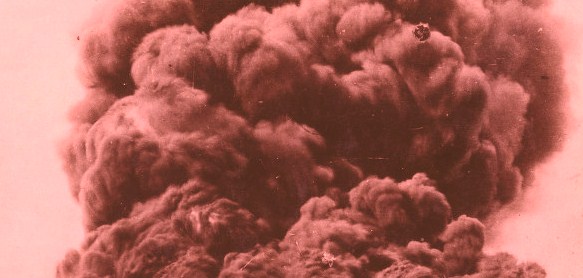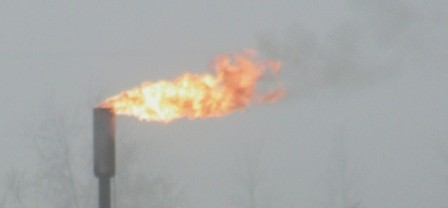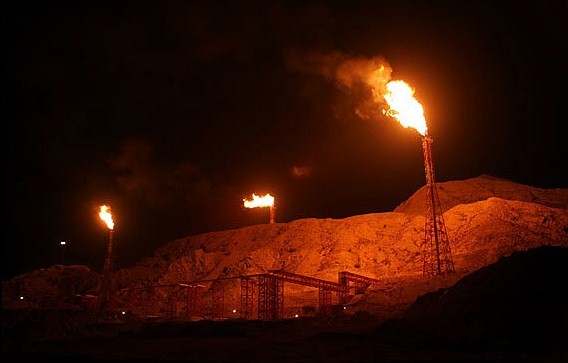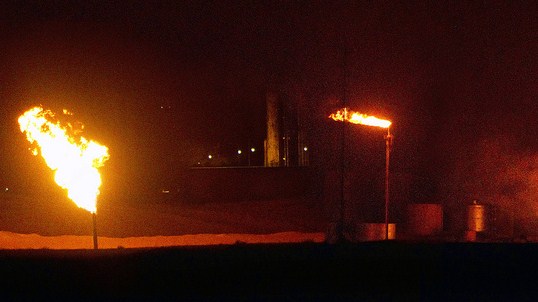An Attack on Iran Could Hike Oil Prices to $200 a Barrel
Road to World War III: A “Final Solution” for Iran, Syria and Hezbollah
In his last appearance in front of the United Nations, Israeli prime minister Benjamin Netanyahu stressed the importance of not letting the Iranians cross what he called a “red line”. Netanyahu showed a childish graphic, but regardless of how crude his illustration was, Israel’s PM is clearly drawing a line in the sand to show his friends in Washington DC that his patience is running out. As the financial sanctions from the West are crippling the Iranian economy, there is a clear message getting hammered into the psyche of public opinion — both in Israel and the United States — that a military strike on Iran is an absolute necessity. It has been framed by Israel, and by AIPAC in the United States as an issue of survival for the Jewish state. Iran’s nuclear program has been defined as an “existential threat” for Israel. And, as usual, at least in terms of foreign policy in the Middle East, Israel is in the driver’s seat of the special relationship with the United States.
The notion of a military strike and regime change in Iran seems to have gained an unstoppable momentum with the West and Israel alike rationalizing and pushing joyfully for a catastrophic geopolitical “final solution” for Iran, Syria and Hezbollah alike. A final solution for the Shiite populations of the Middle-East — compliment of Israel and the United States — with the complicity of Saudi Arabia. One of the “brains” behind this absurd logic of the validity of an attack on Iran by the United States is Matthew Kroenig. Kroenig is a member of the powerful Council of Foreign Relations, and in the January/February issue of Foreign Affairs, he published a paper titled “It is Time to Attack Iran.” The words of Kroenig in his January 2012 essay should be taken very seriously. The CFR member is no ordinary Washington pundit, but a powerful man who used to be a special adviser at the Pentagon for defense strategy and policy on Iran.
“Proponents of a strike have argued that the only thing worse than military action against Iran would be an Iran armed with nuclear weapons. Critics, meanwhile have warned that such a raid would likely fail and, even if it succeeded, would spark a full-fledged war and a global economic crisis. But skeptics of military action fail to appreciate the true danger that a nuclear Iran would pose to US interests in the Middle-East and beyond. And their grim forecasts assume that the cure would be worse than the disease — that is, that the consequences of a US assault on Iran would be as bad or worse than those of Iran achieving its nuclear ambitions. But that is a faulty assumption. The truth is that a military strike intended to destroy Iran’s nuclear program, if managed carefully, could spare the region and the world a very real threat and dramatically improve the long-term national security of the United States,” wrote Kroenig.
War for Oil and the Military-Industrial Complex
According to informed noises, both in Israel and Washington, it doesn’t seem that any attack on Iran or Syria — even so Turkey is already working at softening the Assad regime — will happen before January 2013. This is apparently to respect the United States electoral calendar. But after January, we can all expect some nightmarish scenarios to unfold with only the usual suspect of war profiteering standing to harvest the benefit. First of all, Mr. Kroenig should know better: after all, he was the one running Iranian scenarios for the Pentagon. In his Foreign Affairs paper he failed to anticipate how the Iranian regime would react and retaliate. Iran is not Iraq; a strike on Iran would not be a military walk in the park. The financial sanctions have crippled Iran’s economy, but Iran’s Revolutionary Guard is a force to be reckoned with. Iran has the military capacity to retaliate by striking Saudi Arabia and the Gulf States’ oil fields. Iran’s ally Hezbollah would likely attack Israel from Lebanon. With the biggest oil fields in the world aflame — perhaps for months — and a considerable disruption of oil transit in the Strait of Hormuz, a scenario where oil prices rise up to $200.00 a barrel is not only possible, but likely.
This in return would spark a global economic crisis making the 2008 financial crash look like a picnic. Oil price skyrocketing to this level would spell disaster for European economies already in shambles, for countries such as Greece, Italy, Spain and Portugal which rely mostly on oil for their energy supplies. Asia, China, India, Japan and South Korea would also be extremely affected. The only two world powers sitting on the Security Council, and with enough military to stop this insanity are China and Russia. The weak link in this alliance, however, could be Russia, considering that the country’s geopolitical and economic interests would be at odds with this $200.00 per barrel scenario. As a major oil and gas producer, Russia could be one of the main economic beneficiaries of such disruption of the Gulf oil fields.
Related Articles

















One Response to An Attack on Iran Could Hike Oil Prices to $200 a Barrel
You must be logged in to post a comment Login